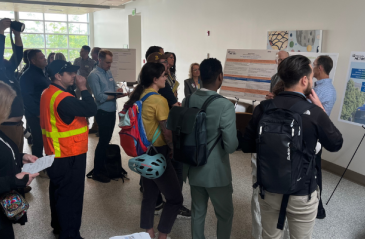
The information barriers holding back climate action and how to break them

Open data needs to be easy to find, explore, analyse, export and reuse – for everyone
Share articleGovernments can ignore open data, but it would not be wise
Share articleTo maintain their significant role governments have to transform themselves into platforms
Share articleWe put our vision for government into practice through learning partner projects that align with our values and help reimagine government so that it works for everyone.
Much has already been said about how open data can improve the public impact of government.
Articles, methodologies, to-do lists and tweets have been written, keynote speeches and talks of all kinds given. We have heard that open data can help transform policing and eventually improve our communities. Boston's StreetBump project has shown that open data can help identify and mend the city's potholes - through the use of smartphone apps and crowd sourcing. We have also seen people develop route calculation apps to improve accessibility for people with disabilities. The list goes on.
To recap, the open data movement is based on making organisational data available online. The data needs to be easy to find, explore, analyse, export and reuse - for everyone. The idea is full of potential, but each of these steps comes with both a human and a financial cost - which lead to doubt and suspicion among government officials about this new approach.
But rather than focus on the return on investment for open data, the real question we should be asking is: what are the costs of not opening up data?
The biggest risk an organisation faces, be it a government or a private company, is disruption, especially when it is uncontrolled. And who are the actors who are trying to disrupt the government? You may be surprised: in France, a para-glider who didn't want to pay for precise weather data just plugged three ADSL lines and a huge ventilation system into his parents' house to run his own models in order to collect his own weather forecast. He released everything as open data.
Our economy is now all about data. Think of how GPS changed the transport sector by allowing almost everybody to do the job of a taxi driver, even without knowing the name of every street in a city. Think of how Google, knowing what its users are looking for, acts as an intermediary to the news, travel, hospitality and online shopping industries. Think of how LinkedIn and HR platforms know much more about anyone's professional life than most of the world's job centres.
This means that access to data and knowledge are absolutely critical. And governments, being among the oldest social structures, are particularly exposed to this form of disruption. Uber is taking down the taxi industry, but it isn't stopping there: it's aiming to transform public transport services wholesale, especially in Europe.
If governments want to maintain the significant role they play today, they have to try to transform themselves into platforms. They need to remain at the intersection of services to their citizens, big business, start-ups, non-profits, citizens, researchers and city planners. Their data has to be the reference data. Government data has to be the blood supply to the whole smart(-ish, for now) network of actors making a particular area a great place to live.
Of course, governments can ignore open data, but it would not be wise. A government's goal is to make its citizens' lives easier. We live in a world where anyone can empower many people around them - through apps, through new business models and new ways of collaborating and communicating. And the people behind that ‘anyone' need data to do so.
Knowing that the biggest risk is uncontrolled disruption, a government has to figure out its main functions, priorities and competencies: transportation, safety, and business and social programmes. It also needs to identify the people that benefit from those functions. Once the government is clear on these three points, it can start work on releasing data in the most effective way. The most basic approach to open data is a simple catalogue of downloadable links. If this is done well, with clean and ready-to-use data in a clear format, it should help create a first - and important - community of users.
However, in most cases this is not enough. There's also the question of how users access the data. Developers will opt for an up-to-date application programming interface to the raw data; non-techies may prefer ready-to-use tools that help them explore, analyse and understand the data. The governments must decide how to deliver open data, and they need to do it quickly.











